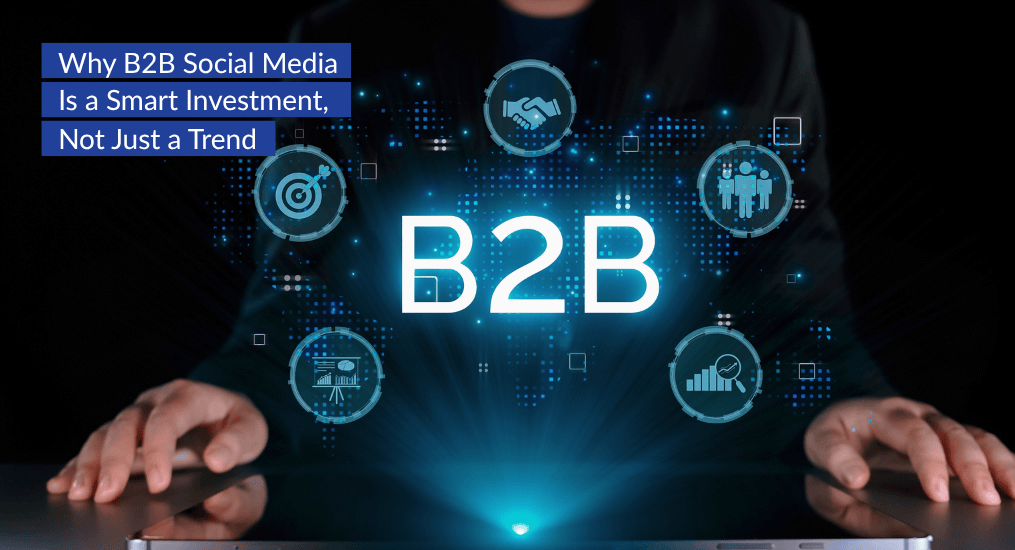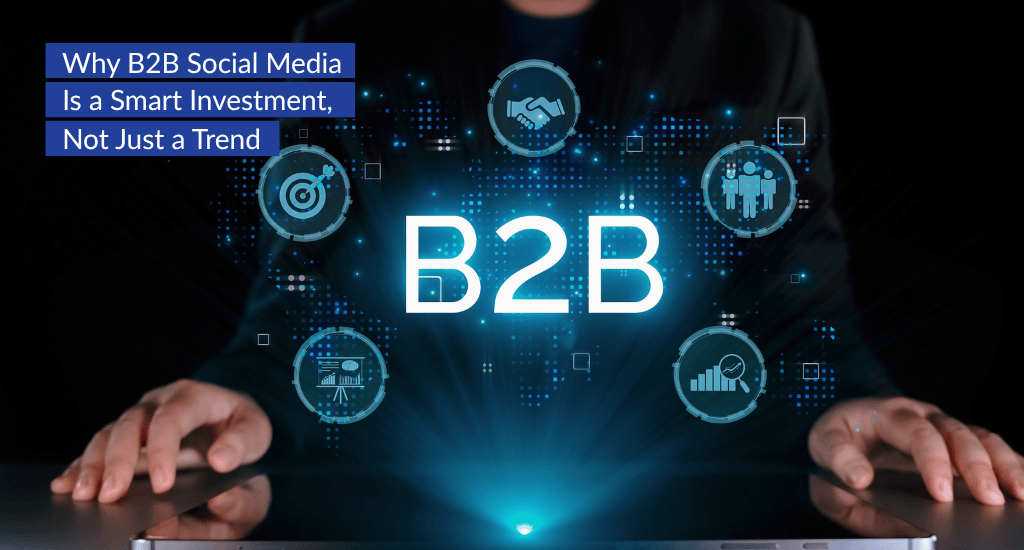Why B2B Social Media Is a Smart Investment, Not Just a Trend
Introduction: Breaking the Myth
Let’s address the elephant in the room: many business leaders still believe that social media is “just for B2C” companies. This outdated misconception has prevented many B2B organizations from making the most of valuable opportunities to connect with their audiences and drive business growth.
The reality is different. Today’s B2B marketing strategy landscape has undergone complete digital transformation, where social media plays a central role. While consumer brands were early adopters, B2B companies are discovering that platforms like LinkedIn and Twitter deliver impressive social media ROI when approached strategically.
B2B social media isn’t just about posting company updates anymore. It’s about creating genuine online engagement that generates qualified leads, stronger partnerships, and increased revenue. Companies leading this change are outpacing competitors stuck in traditional marketing approaches.
The Business Value of B2B Social Media
In the B2B space, social media’s true strength lies in its ability to build lasting professional relationships and humanize your brand. Unlike traditional advertising, these platforms enable meaningful conversations with prospects, clients, and industry peers daily.
Your brand awareness expands significantly when you consistently share valuable insights and participate in industry discussions. This transforms your company from a vendor into a trusted resource, directly impacting the B2B buyer journey by keeping you top-of-mind as decisions are made.
Crucially, social media excels in relationship marketing. It provides direct access to key decision-makers who might otherwise be unreachable through traditional cold calls or emails. By engaging authentically with prospects’ content and making meaningful contributions to industry conversations, you build the relationships that naturally lead to business opportunities.
Most importantly, social platforms are powerful tools for thought leadership. Consistently sharing original perspectives and practical advice establishes your executives as authoritative voices in the industry. This, in turn, significantly boosts your entire organization’s credibility and market position.
Data-Backed Proof That It Works
The data strongly supports B2B social media investment. LinkedIn drives approximately 80% of B2B social leads, making it necessary for most business-to-business organizations. This reflects the platform’s unique position as the primary professional networking hub where decision-makers actively seek solutions.
Data-driven marketing approaches reveal compelling insights. Companies maintaining active social presences see 78% better social proof metrics compared to those with minimal activity. This social proof becomes important when prospects evaluate potential vendors.
Consider Salesforce’s B2B case study – they’ve built massive followings by sharing customer success stories and industry insights. Their content performance consistently generates thousands of qualified leads monthly, with conversion metrics showing social media-originated leads often have higher lifetime values than traditional channel leads.
Another excellent example is HubSpot. Through their robust thought leadership on LinkedIn and Twitter, they’ve generated millions in potential business. Their approach effectively combines valuable educational content with subtle product positioning, leading to conversion rates that consistently beat industry averages.
Social Media = A Long-Term Asset
Unlike paid advertising that stops working when you stop spending, social media content continues generating results long after publication. This “evergreen” content builds value over time, making it one of the most efficient long-term marketing investments.
The life of your content on social platforms goes far beyond its initial post date. A well-written LinkedIn article or an insightful Twitter thread can keep attracting potential clients and boosting your brand’s visibility months or even years later. This makes quality content a true digital asset that grows in worth over time.
Audience engagement patterns clearly show social media’s lasting power. As your follower base grows, every new piece of content reaches larger, more qualified groups of people. This natural growth leads to a massive increase in reach without requiring a proportional increase in effort from your side.
Finally, the fact that social media content is searchable adds another layer of value. When potential clients look up your company online, your social content often shows up in their search results. This transforms your social presence into a valuable SEO asset that supports your broader digital marketing goals.
Shifting Buyer Behavior in B2B
Today’s B2B decision makers have fundamentally changed how they research vendors. Modern buyers conduct extensive online research before contacting sales, often completing 70% of their digital buyer journey independently.
This shift places enormous importance on your online presence. Prospects actively seek information about your expertise and track record through social channels, reading posts and assessing industry knowledge before sales conversations begin.
A vendor’s credibility now increasingly relies on their social media presence. Companies that don’t engage much look less established than competitors with active, professional profiles. This can seriously reduce potential clients’ confidence.
Buyer intent has also changed in the social media age. Potential clients now show their interest in buying through their social activity – like content they share, discussions they join, and companies they follow. Smart B2B organizations monitor these signals to find interested prospects and connect with them in the best way.
Managing your online reputation is now directly tied to your social media strategy. Reviews and public interactions on social platforms shape your digital reputation. A strong social presence lets you actively build your reputation instead of leaving it to chance.
Social Media Supports Other Channels
B2B social media functions as a powerful amplifier for your entire marketing ecosystem. Well-executed cross-channel strategy leverages social media to enhance email marketing, SEO, and sales outreach performance.
Your digital ecosystem becomes more cohesive when social media serves as a content distribution engine. Blog posts, case studies, and webinar recordings gain new life when shared and discussed on social platforms, ensuring maximum content investment returns.
Integrated marketing approaches, including social media, consistently outperform single-channel strategies. Social content supporting email campaigns gives sales teams more prospect touchpoints, while social activity boosting SEO makes your entire digital presence more discoverable.
Funnel optimization benefits significantly from social integration. Prospects engaging with social content before entering traditional sales funnels often convert at higher rates and progress more quickly, arriving more educated about your solutions.
Budget-Friendly and Measurable
B2B social media investment offers exceptional cost-effectiveness compared to traditional channels. While trade shows and print advertising require substantial upfront investments, social media marketing delivers significant results with modest budgets.
Marketing ROI from social activities often exceeds conventional channels because entry barriers are lower and targeting capabilities are more sophisticated. You can reach qualified prospects based on job titles, company size, and interests, ensuring relevant audience reach.
Cost-effective marketing means achieving better results per dollar invested. Social platforms provide powerful analytics, enabling precise performance tracking, helping identify which content types and strategies deliver the best returns.
Campaign analytics offer unprecedented performance visibility. You can track everything from reach to lead generation, creating clear pictures of what’s working. This transparency makes campaign optimization straightforward.
KPI measurement becomes simple with detailed social media metrics. Whether tracking brand awareness or lead generation, platforms provide necessary data to demonstrate value and make informed investment decisions.
The ability to test and iterate quickly is another major advantage. Unlike traditional channels requiring weeks for changes, social media allows real-time adjustments based on performance data.
Final Thoughts & Call to Action
The evidence is clear: B2B social media represents a strategic investment delivering measurable returns, not a passing trend. Companies embracing social media as core B2B growth strategy components build sustainable competitive advantages while hesitant competitors miss opportunities.
Your social media strategy should integrate with broader business objectives, supporting lead generation, customer retention, thought leadership, and brand building. The key is approaching social media with strategic rigor, clear goals, measurable outcomes, and consistent execution.
Digital transformation of B2B marketing is accelerating, and your online presence increasingly determines market position and growth potential. Companies delaying social media investment aren’t just missing current opportunities – they’re falling behind in building digital assets driving future success.
Now is the time to audit your current efforts and identify improvement areas. Consider partnering with a marketing partner who understands your industry’s unique challenges. Your competitors are already investing in B2B social media – will you lead or struggle to catch up?
Audit your social media presence and create your strategic plan today.
✉️ Email : Hello@VelocittaIndia.com
📞 Phone Number: +91 8956437437


